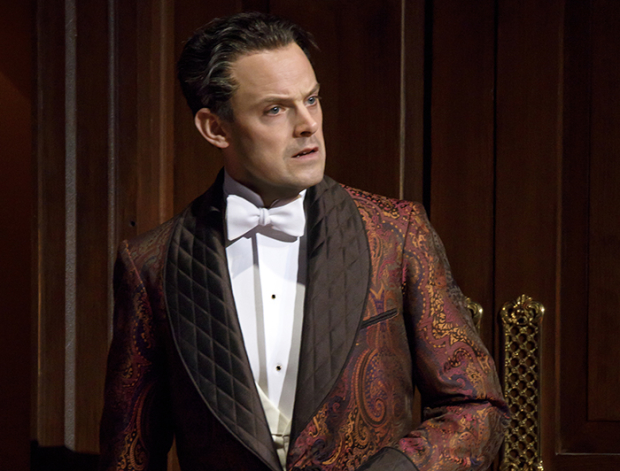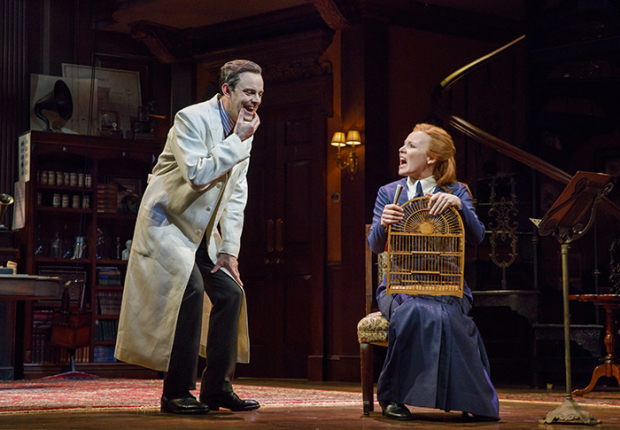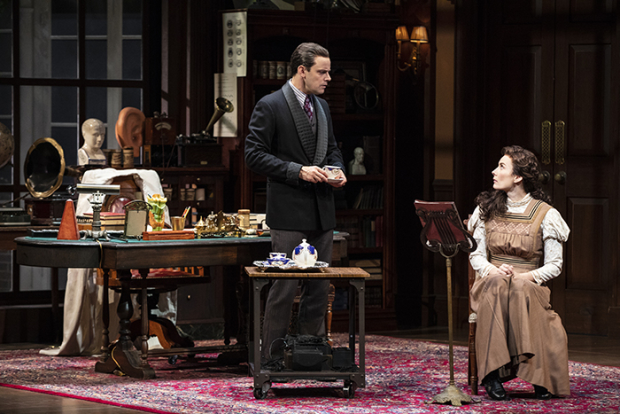Final Bow: My Fair Lady's Harry Hadden-Paton Blows the Lid Off the Secret of Eugenia
The Lincoln Center Theater revival’s original Henry Higgins looks back on his Broadway debut and decides which set piece to steal on his way out the door.
Harry Hadden-Paton has been walking in Professor Henry Higgins's famous slippers since March 2018 when Lincoln Center Theater's Tony-nominated revival of My Fair Lady began performances at the Vivian Beaumont Theater. He plays his final performance as the self-aggrandizing phonetics expert on July 7, leaving his luxurious Edwardian home (designed by Michael Yeargan) and satisfying Lerner and Loewe score behind. But before he bids one final farewell to Eliza Doolittle (who ends this version of the musical on a uniquely independent note), Hadden-Paton gives us the skinny on some memorable mishaps, inside jokes, and best-kept secrets (hint: there may be another Cockney girl roaming around that London estate).

(© Joan Marcus)
1. What is your favorite line that you get to say or sing?
"The great secret Eliza, is not having bad manners or good manners or any other particular sort of manners but having the same manner for all human souls. The question is not whether I treat you rudely, but whether you ever heard me treat anyone else better."
It's a slow-burn of a line, but the perfect example of how with a carefully wrought bit of Shaw you just need to trust the text for the audience to enjoy it. There's no need to color it, or signal to the audience that it's funny.
2. What is your cast's best inside joke?
Few people know this, but Eliza is not Higgins's first attempt at improving a girl's status by changing her accent. Oh no. Underneath the floorboards of the study lurks his most recent victim, Eugenia!
This started off as a joke backstage where during the overture we would imagine her raising her head through the floorboards to sing "I woulda, coulda, shoulda danced… if I could dance."
But more recently she has also been known to pop her head out and ask for food in the middle of a scene… so if you ever see me stamping on the ground at a strange moment then you know that Eugenia got hungry!!
3. What was the worst technical difficulty you experienced during the run, and how was it handled?
Well, the one that instilled the most fear in me was when I split my pants just before "I've Grown Accustomed…" It was handled eloquently by my dresser with "Nothing I can do about it now! Just get out there and don't look at it…"
4. What is the most interesting present you received at the stage door?
I received a playbill from the original production of My Fair Lady that was very thoughtful.
5. Who is the coolest person to come see the show?
I'd have to say New York's finest pediatric neurologist Dr. Walter Molofsky. The coolest customer in town and just one of the many New Yorkers my family and I are indebted to during our stay here.

(© Joan Marcus)
6. If you could steal one item from Michael Yeargan's set, what would it be?
Over the course of the run I've named a few of the things that make up Higgins's world; the robot that pushes the study to the front of the stage is called "Monty," the contraption with the flame that tells us if Eliza is pronouncing her 'h's correctly is called "Jonty," but the thing I'll definitely be trying to steal at the end of the run is the model of a larynx that sits on my desk, called "Vagina Trout."
7. Which of Lerner and Loewe's songs have audience members been most likely to sing along to?
Not mine! I do get the odd person joining in with "I've Grown Accustomed to Her Face," but on the whole I think Eliza gets the karaoke tunes!
8. Complete the following sentence with the words most relevant to your own life: Why can't a be more like a ?
Why can't a salad be more like a bagel?
9. What do you think happens to both Eliza and Higgins after they part ways at the end of the show?
Well, with regards to Eliza, the men invest in a flower shop for her, which she makes a huge success of, and within a year or two she repays their investment. She falls in love with someone less obsessed with the class divide, an American probably, and has a beautiful life. She outgrows the men and their connection fades away.
As for Henry, he buries his feelings for Eliza, and after weeks of being miserable Pickering takes him to India for a change. From there he travels around the world with his notebook collecting dialects which he will eventually publish to great acclaim. He achieves wealth and great notoriety, but never gets over the flower-girl who stood up to him.
Epilogue: Whilst on a beach in Ceylon he remembers about Eugenia under the floorboards and wires to Mrs. Pearce to set her free.

(© Joan Marcus)










